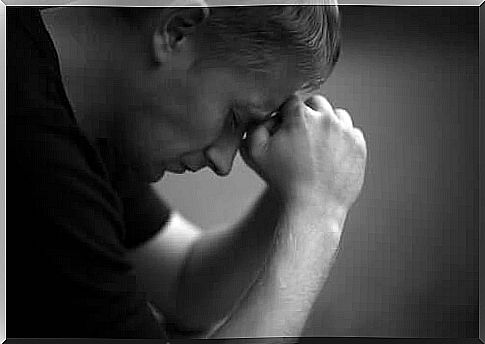The Stage Of Anger In Grief: How Is It Perceived?

Anger is a very common condition when you suffer from adversity. Unfortunately, there are many who get caught up in the stage of anger within grief.
They collapse emotionally and cannot get over their anger after losing someone close to them.
It is not easy to deal with these feelings of anger as well as the inability to accept that what happened changed your temper and limited you.
Shakespeare said that you can reduce the pain by crying, but what if you can not reach this stage? You can then be transformed into a stone that sinks deeper and deeper into the well of sorrow.
Of all the stages of grief defined by Elisabeth Kubler-Ross, anger and frustration are perhaps the most difficult to deal with.
This is the stage when you really start to understand that you have lost the other person. But instead of accepting this, you rebel.
You’re trying to find someone or something to blame. You begin to feel unfairly treated, you feel bitter and these feelings continue to build up in your mind and body.
All these intense emotions turn into a storm. You want to maintain control over your life, but you feel that this is not possible.
The reason is that anger has turned into rage, and it can turn you into something you are not.

The stage of anger in grief
The stage of anger in grief is like a powerful rejection of the idea that you have lost someone.
Let’s not forget both grief and anger is an instinctive response that has helped humans survive because our brains perceive it as a threat.
What could have a bigger impact than losing someone close to you? The pain is endless and your brain responds to it.
It is perfectly normal to go through these stages. Some studies, such as the one conducted by Dr. George A. Bonnano at Columbia University, believes that there is no “normative” form of grief.
In other words, Dr. Kubler-Ross has described the steps correctly, but everyone experiences them in different sequences.
With that said, there is also a special form of complex grief, such as frozen and delayed grief. In both of these cases, you carry with you your grief for several years without resolving it.
This almost always leads to depression. But let’s return to today’s topic: the stage of anger in grief.
An obsession with what happened and unanswered questions
When you lose someone, it is common for you to ask yourself many questions. One of the most common of these issues may seem like self-pity, but it is also something that is full of anger.
That’s when you ask yourself things like “Why did this happen to my father? He was still so young! He was so kind and loved life so much. Why did he disappear so quickly? ”
These thoughts become fixed obsessions in your mind if you get stuck in this stage of grief. Your obsession with what happened and your attempts to find explanations or someone to blame are common phenomena at this stage.
Hypersensitivity and the stage of anger in grief
The stage of anger in grief also tends to involve extreme hypersensitivity. All of a sudden, you can be deeply affected by unexpected stimuli, news or events.
You then build this up negatively in your mind and it ends up getting you out of balance.
Personality and temperament change
One thing you need to understand when it comes to anger and rage is that these feelings can transform you. They can turn you into someone you are not, someone you do not like or someone you do not want to be.
You can start to lose your motivation. Things you used to like are no longer interesting to you. Your patience and your curiosity begin to disappear.
You stop bonding with other people. Your empathy can also disappear because your suffering puts you in a situation where you only focus on yourself.

Apathy, physical pain and minor depression
The stage of anger in grief can also lead to certain psychosomatic problems.
You may begin to experience things like stomach pain, physical and mental exhaustion, headaches, insomnia and a greater risk of developing infections.
You may also start to experience some minor symptoms of depression, which can get worse if left untreated.
How to get through the stage of anger in grief
One of the main dangers involved with this anger is that it can lead you to potentially harmful behaviors. Some people start drinking, playing or something else that helps them “forget” the pain.
When you have to get through this stage, therapy is not only a good idea, but it is also the only effective way to take control of your life again and get back on track.
Here are some of the strategies you can use:
Strategies to get through this stages
- An evaluation of your health first. Before the patient begins the therapy, a health examination must be performed to ensure that there are no other health conditions.
- If you are going to go through therapy, you must also be motivated to do so.
- A good technique is cognitive restructuring. One must begin to identify one’s limiting and irrational thoughts. This will make it easier for you to channel your emotions, get some relief and find resources to help you with your emotional pain.

It is good to mention that this form of therapy tends to vary greatly depending on your needs. You should not think that this will solve your problems quickly.
It is a long process where the patient and the therapist must agree.
But do not worry because it succeeds most of the time and it can help you get through the stage that you are stuck in.
Books like Letting Go With Love: The Grieving Process by Nancy O’Connor can be very helpful for the person who has problems with grief.









